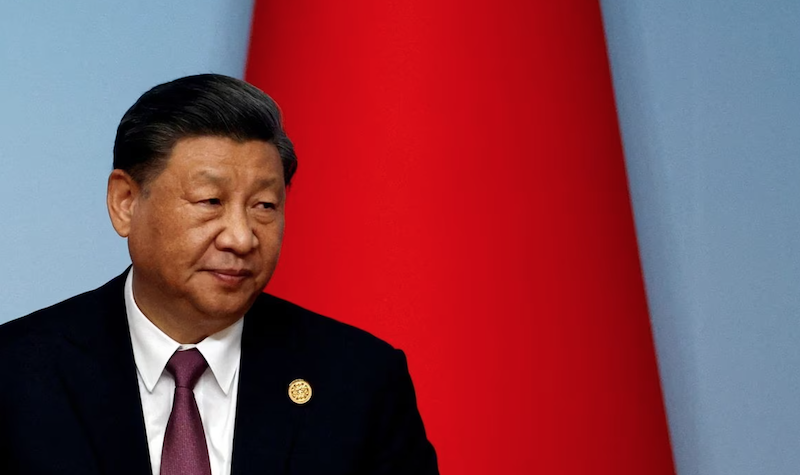Chinese President Xi Jinping has called for stable and peaceful Sino-US relations, saying the two superpowers were responsible for global peace and stability.
“They should and must achieve mutual respect, peaceful coexistence, and win-win cooperation,” Xi said.
Xi made the comments to two US Flying Tigers veterans who fought for China during World War II, saying the two countries had shared the same enemy in their fight against Japan and had forged a “profound” friendship, Chinese state media reported on Tuesday.
Also on AF: US Business Outlook in China Sinks, Firms Looking at SE Asia
“Looking to the future, China and the United States, as two major countries, bear more important responsibilities for world peace, stability and development,” Xi said in his reply to a letter from former pilot Harry Moyer and pilot gunner Mel McMullen.
The American Volunteer Group, known as the Flying Tigers, was a fighter group, comprising former US pilots hired by the Republic of China led by Chiang Kai-shek’s Kuomintang, to fight against Japan in 1941-42.
The airmen, whose planes were iconic for their shark faces, were widely known in China for their feats of bravery in the face of larger Japanese forces as they took to the skies from rural runways paved by Chinese people by hand.
The Chinese president’s call for better ties follows a series of meetings and talks between US and Chinese officials in recent months aimed at reducing persistent tensions and restoring channels of communication including contact between their militaries.
Xi’s reported statements followed similar comments by Chinese Vice President Han Zheng on the sidelines of the United Nations General Assembly on Monday.
“Currently, China-US relations face many difficulties and challenges,” Han told US Secretary of State Antony Blinken.
“The world needs stable and healthy China-US relations.”
US lobbying for ‘face-to-face diplomacy’
The meeting between Han and Blinken involved “a candid and constructive discussion,” the US State Department said in a statement after the meeting.
The two agreed to maintain open lines of communication and discussed Russia’s invasion of Ukraine, North Korea and the Taiwan Strait, the department added.
Their talks could help set the stage for a meeting between US President Joe Biden and Chinese President Xi Jinping later this year.
“The world expects us to responsibly manage our relationship,” Blinken said in brief remarks at the beginning of his meeting with Han. “The United States is committed to doing just that,” he added.
“From the perspective of the United States, face-to-face diplomacy is the best way to deal with areas where we disagree, and also the best way to explore areas of cooperation between us,” Blinken said.
Xi-Biden meeting anticipated
Han and Blinken’s discussions followed 12 hours of meetings last weekend between White House national security adviser Jake Sullivan and Chinese Foreign Minister Wang Yi in Malta.
Blinken, US Commerce Secretary Gina Raimondo, Treasury Secretary Janet Yellen and Biden climate envoy John Kerry have travelled to China this year to thaw relations that spiralled after the US military shot down a suspected Chinese spy balloon that traveled over the United States.
Various US officials, including Biden, have since denied the balloon conducted surveillance or was even in a deliberate flight over US airspace.
Biden, meanwhile, expressed disappointment this month over Xi skipping a summit of Group of 20 leaders in India, but said he would “get to see him.”
The next likely opportunity for Biden to hold talks with Xi is an Asia-Pacific Economic Cooperation summit in San Francisco in November, where US aides for months have hoped to stage such a meeting.
Neither Blinken nor Han in their remarks explicitly mentioned whether such a meeting would materialise.
‘Not just relationship management’
Han noted that China hoped the US would make efforts to implement the consensus reached by the two countries’ leaders and promote the stable development of relations.
The world’s two biggest economies are at odds over issues ranging from Taiwan to trade, fentanyl and human rights. Critics of the Biden administration have questioned its strategy of engaging China, warning that a failure to push back on provocations, including the recent China-linked hacking of senior US officials’ email, could embolden Beijing.
Federal Bureau of Investigation director Chris Wray told a conference on Monday that China has a cyber espionage programme so vast that it is bigger than all of its major competitors combined.
Ryan Hass, a China expert at the Brookings Institution, said the pace of high-level exchanges between Washington and Beijing suggested that efforts were “purposeful” and not just part of relationship management.
“I expect both sides are working to set the stage for a productive meeting between both leaders in November,” Hass said.
- Reuters, with additional inputs from Vishakha Saxena
Also read:
China Must Change Course, For Its Own Sake And World’s: IMF
Raimondo Warns China Patience Of US Business ‘Wearing Thin’
US Checking EV Battery Imports Over China Forced Labour Fears
US to Cut China Access to Amazon, Microsoft Cloud Computing: WSJ
China Seen Blocking US Chip Giant’s $5.4bn Merger With Tower
China Stalling Merger Reviews of US Chip Firms, Others – WSJ
Pentagon Says Chinese Spy Balloon Drew a Blank – Guardian
























